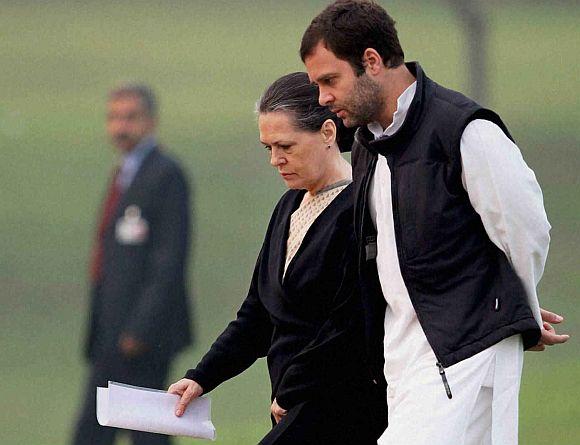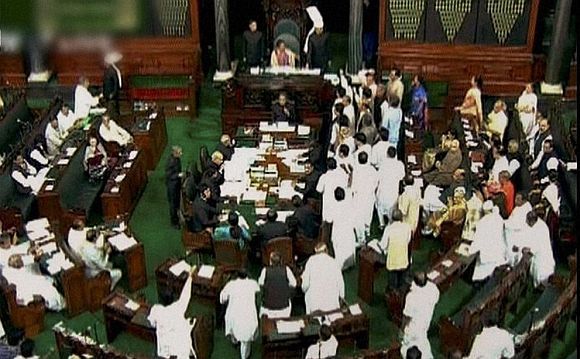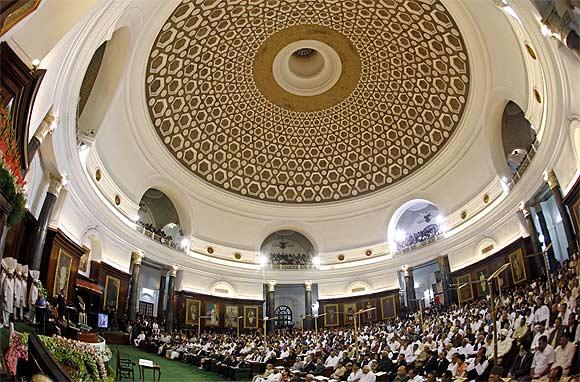Sheela Bhatt followed the celebration of 60 years of Parliament from the Central Hall's balcony. 'It was undoubtedly a privilege to participate in the historic function to mark the 60th anniversary of Parliament,' she says, 'but in the end there were no new ideals, ideas or hope added to democracy's great history.'
One can only imagine how, 60 years ago, President Dr Rajendra Prasad, Prime Minister Jawaharlal Nehru and the other great patriotic souls of India participated in the first joint session of Parliament, infusing it with the warmth of their personalities, the dignity of the Constitution and hope for the future of Indian democracy.
When compared with the extraordinary depth of those who then led the nation, Parliament today presents a strong contrast. 'Ordinariness' bordering on mediocrity is what characterises the so-called august House now.
It was undoubtedly a privilege to participate in the historic function to mark the 60th anniversary of Parliament on Sunday, but, in the end, there were no new ideals, ideas or hope added to democracy's great history.
As President Pratibha Patil arrived to address the joint session, one felt a momentary feeling of ecstasy, but that was only because the Jana Gana Mana was played.
The special session of Parliament, held in the magnificent Central Hall, was lacklustre. There were no inspiring speeches, no innovative ideas to strengthen Indian democracy nor any clear direction for the future of democracy itself.
Shockingly, the planning and execution of such a grand event was more like a jugaad for which today's India is known for. It was neither imaginative, nor inspiring.
The use of technology was not thought of at all.
The larger participation of the people of India was absent.
On a day when INDIAN identity should have dominated, the cultural element of the celebration remained limited to the government's typical Hindu-Muslim and North-South balancing act. It was boring.
Pandit Shiv Kumar Sharma, Pandit Debu Chaudhuri, Maharajapuram Ramachandran, Shubha Mudgal and Iqbal Khan performed as well as they always do, but the back-benchers were hardly attentive.
Please ...
It was the right moment to honour Rishang Keishing, a member of the first and third Lok Sabhas; Resham Lal Jangde, a member of the first, second and ninth Lok Sabhas; and Kandala Subrahmanyam and Kanety Mohana Rao, members of the first Lok Sabha.
Unfortunately, the event was not rehearsed. These special guests appeared to have no clue as to who would honour them, or where or how.
President Patil, Vice-President Hamid Ansari, Prime Minister Manmohan Singh and Speaker Meira Kumar had to honour three of them in one corner of the Hall. The television cameras could not get the right angle nor could the cameramen capture the correct frame. The movement of the dignitaries was messy.
The heaps of annual reports, question papers and documents that Parliament produces are normally kept on the floor, on the stairs and in the nooks and corners of this historic building. Today, they were pushed behind temporary curtains and covered with white cotton cloth.
The event did not stick to the schedule -- it was to conclude at 7.20 pm, but went on till 8 pm.
The arrangement of flowers on and around the dais, very important at such formal events, was a disaster.
The temporary stage was shabbily erected. The flowers were sprayed recklessly, making them look artificial. The ugly, chemical-based colours were an eyesore.
You could be forgiven for wondering if you were in a tiny studio in a small Indian town instead of the majestic innards of Parliament.
Please ...

Vice-President Hamid Ansari, who is known for his crisp and well-researched speeches, noted, "Sixty years is a good time to assess the working of Parliament in two critical areas of its functioning -- ensuring accountability and oversight of the executive, and deliberation and law making."
"Both tend to exhibit declining efficacy," noted the man who could well be India's next President. "The institutional mechanisms and procedural norms for ensuring accountability are being progressively underused. There is a perceptible drop in the working days of Parliament."
"Deliberation," Ansari noted, "is less frequent; legislation is at times hasty."
As the vice-president spoke, Congress MP Satyvrata Chaturvedi was spotted mixing tobacco and lime on his palm, expertly grinding the mixture with his thumb. Once it was ready to his satisfaction, he pinched it up and tucked it under his tongue.
Chaturvedi's act symbolised something more than the fact that Indians these days lack an attention span and serious engagement.
Sonia Gandhi, the Congress president, sat in the front row, belying rumours that she does not keep well these days. When she entered the Central Hall of Parliament, wearing light make-up and an off-white sari, she drew everyone's attention.
There is no doubt that, in Parliament, she embodies authority. The eyes of some 800-plus onlookers inside the hall was proof of this fact. She was seated in the front row; her son Rahul sat in row 14.
Throughout the event, which lasted more than two hours, Rahul was seen speaking with young MPs. For 45-odd minutes, he was engaged in animated discussion with Arun Yadav, a second term MP from Madhya Pradesh.
Rahul was hardly paying attention to the event. He was either fiddling with his cell phone or engaged in discussion.
Please ...

The entire leadership in Parliament looked fragmented.
The 'unity of purpose' amongst MPs that President Patil spoke about was missing in Parliament.
Dr Manmohan Singh has kept his face and public persona frozen for the eight years he has been prime minister. His speech -- "Unfortunately, the number of serious discussions in Parliament has declined in recent years" -- echoed Ansari's address.
His Congress party is to blame in a big way for this sorry state of affairs.
Sonia Gandhi spoke on the occasion. Normally, the Congress president does not speak in the House; alas! she did not add to the debate.
One wondered: Was there any inspiration in the front row of Central Hall?
Finance Minister Pranab Mukherjee, the Leader of the House in the Lok Sabha, was seated alongside Sushma Swaraj. the Leader of the Opposition in the Lower House. Mukherjee is the leader-in-waiting, waiting to hear from Sonia Gandhi if she will agree to nominate him as the United Progressive Alliance's candidate for the Presidency.
The veteran Congressman is anxious; he wants the media and civil society to take up his 'deserving case' to be Rashtrapati.
These days, his engagement is mainly about his covert fight to get his due from his party and its leader.
Agriculture Minister Sharad Pawar, who has been unable to boost Indian agriculture, sat in the front row with Defence Minister A K Antony and Home Affairs Minister P Chidambaram.
Health Minister Ghulam Nabi Azad sat in the next row.
Antony, Azad and Pawar have not been able to perform; this has contributed to the failure of the UPA's second term.
Chidambaram, in his trademark white mundu, was seen enjoying the music. He even removed his sandals for a while.
Of all the UPA stalwarts in the front row, he must be the most worried. Besides allegations of being embroiled in the 2G controversy, he now confronts allegations of having enabled his son to get shares in the telecom company Maxis and benefit from the Aircel-Maxis deal.
Please ...

Three Bharatiya Janata Party leaders were seated in the front row as well.
L K Advani is angry that no one listens to him any more in the BJP.
Sushma Swaraj is losing support amongst saffron cadres while Arun Jaitley, the Leaded of the Opposition in the Rajya Sabha, is playing smart politics with Gujarat Chief Minister Narendra Modi on one side and BJP President Nitin Gadkari on the other.
Jaitley has the upper hand so far, but his area of influence only helps him get his way in the BJP; his influence, for the moment at least, does not extend beyond his party.
'In this glorious dawn of democracy, Parliament gave voice to the hitherto voiceless and marginalised people and it is in the chambers of this sacred institution that our elected representatives shape and decide the destiny of over 120 crore people,' Speaker Meira Kumar, whose father Babu Jagjivan Ram was a member of the First Lok Sabha, said.
One could hardly attribute such lofty ideals to Samajwadi Party leader Mulayam Singh Yadav or Bahujan Samaj Party leader Mayawati, who were also sitting in the front row. Both leaders faces cases which are being fought in the Supreme Court of India.
As one looked down from the B chamber of the Central Hall's balcony, one only saw uninspiring political theatre, incapable of fulfilling Nehru's dream that Vice-President Ansari mentioned in his speech.
"Our collective resolve on this historic occasion must be, to use the words of Jawaharlal Nehru, to restore 'the majesty of Parliament.'"
What, we are left to wonder, Sir, is that?